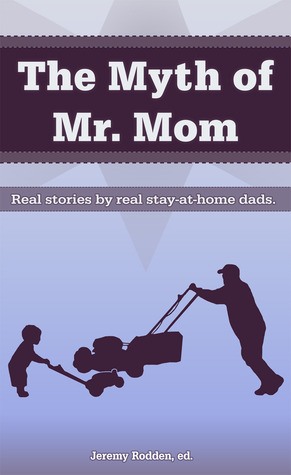Self-publishing seems to be a getting a lot of attention at the moment, both online and in the press – and not all of it positive. To lay waste to some of the myths about self-publishing I’m inviting indie and self-published authors to share their thoughts on the publishing revolution and how it has shaped them. This week I’m delighted to welcome Jeremy Rodden, whose titles Toonopolis and The Myth of Mr Mom: Real Stories By Real Stay-At-Home Dads are currently both on Top 100 Bestseller lists at Amazon.com.
Self-Publishing – It’s The American Way
In the wake of bestselling author Jodi Picoult’s recent interview with the Daily Beast, wherein she declared ‘DO NOT SELF PUBLISH’ as her recommendation to aspiring authors, many independent and self-published authors have been up in arms in defense.
As a self-published author, I have often advocated self-publishing as an option to my fellow scribes. In fact, I think self-publishing is a great example of things being done the ‘American Way.’ And wouldn’t it be wrong for Superman to have fought for it all these years if we didn’t take advantage of the opportunity to live it? (Granted, Superman recently renounced his American citizenship but that’s a different story.)
Politicians often refer to small business as ‘the backbone of American economy‘. What is a self-published author other than a small business? Why would Jodi Picoult discourage people from following the self-publishing path? Indie author and self-publishing advocate David Gaughran discusses Picoult’s theory on the myth of a segregated marketplace here.
My contention, though, is that a self-publisher is the same as a small business owner. Is there risk involved? Absolutely. The small business owner has to write his or her own plan for success. They don’t necessarily draw a paycheck at the beginning of their journey. Just like a self-published author, they are following a dream and putting in sweat equity that may or may not pay off in the end.
The most wonderful part of self-publishing, in my opinion, is the amount of control the individual has in his or her own success. I am not writing here to disparage the legacy/traditional publishing model (Joe Konrath and David Gaughran handle that plenty on their blogs). However, the truth of the matter is that a lot of control is taken away from the author under those systems. The author loses final editing control and final say in the titling and cover art. Also, the level of marketing is done at the whim of the publisher.

The beauty of living in a democratic and capitalist society (not JUST America, of course) is that there are many different paths to success. For some authors like myself, self-publishing has opened doors to realize our dreams. For others, traditional publishing is the only way to fly. All in all, the joy of our industry is that there are OPTIONS. Options and individual choice: the real backbone of democracy. Don’t let anyone ever tell you that there is only one ‘right’ way to do things. That would be undemocratic.
About Jeremy
Jeremy Rodden considers himself a dad first and an author second. He is the author of the middle grade/young adult Toonopolis series of cartoon novels, as well as the editor, publisher, and contributor to the #2 bestselling Kindle book on Fatherhood, The Myth of Mr. Mom – Real Stories by Real Stay-At-Home Dads. He can be found online on Facebook or on Twitter.




An excellent article – and I would agree that control is the best of self-publishing, although marketing /exposure is the worst. I love to write and at least now I have the chance to show others…despite the knives waiting to plunge! :)
Julie,
Thanks for your comment! I agree that we often see the major trade-off in the industry is the willingness to lose some control over the final product for the assist in marketing and exposure. A lot of insiders (such as Joe Konrath, as I mentioned above) often suggest that is a bit of a fool's wish in the way things are ACTUALLY handled from large publishers.
Having never been traditionally published myself, I can't say whether or not that is a fair assessment. But, at the end of the day, for me personally: I'd rather my success or failure fall on my own shoulders rather than hope for someone else to lift me up.
Best of luck to you! Don't worry about the knives. They can't pierce deep enough to kill, just enough to learn how to avoid them. ;)
-Jeremy
Thank you so much for visiting, Julie! I agree, Jeremy has made excellent points. Marketing is difficult – but having control over the way your own book is marketed can be a real plus point too.
Interesting post! I'm glad I didn't (couldn't?) self-publish when I first started out (1999!) I kept getting rejections, and there was a reason. When I look back at those first books I can see I wasn't ready yet. It took ten years to get published, to get an agent etc.
But now I'm thrilled to have self-publishing as not only an option, but as a wonderful way to produce books where I get to have final say in everything, from the edits to the formatting to the cover art to the price. I love it! :) Being a self-publisher is definitely being a small business owner, like you said! :)
Shoshanna,
Thanks for commenting! Just like a small business owner, we also need to learn our own limitations. We may have limited budgets but for some (like myself), creating a cover on my own is impossible. I don't have the artistic talent. That's where I pay a pro. Same with editing.
We have to take risks, decide where we need to spend money, and decide what our goals are. They have to be realistic. As I said, I've seen other indie authors hit amazing levels of success. Do I envy them? Absolutely. Do I hate them for it? No way. I also have seen the work they've put in to reach those levels of success, work that I have been either unable or unwilling to match.
But that's life in the real world. If we want to be successful, we can work hard and get there. That's the American Dream that has been sold to people for the last few hundred years. It's not easy but it's real. :)
Thanks again!
-Jeremy
Shoshanna
I am pleased that you were and are successful in both methods of publishing. I too feel that the route that includes others vetting a product most often leads to a better product.
Well done.
Rik
You're so right, Shoshanna! As Jeremy says, it's all about options. It isn't right for everyone but it's great to have that avenue to explore if it suits you.
All the bad-mouthing on both sides of the equation only makes the atmosphere toxic for all of us. If you are an author, educate yourself on the pros and cons of all publishing options and take the path that works for you, at the time, and with a particular project.
The choice you make might change, depending on circumstances. Yes, this post is spot on. There is no one right way. There's the way that best works for you and your book.
Thank you!
LJ,
Thanks for the comment! I am a very sarcastic person and sometimes people mistake that for negativity, so I'm glad that you were able to see to the heart of my message here. It is one of positivity.
Blanketly stating DO NOT SELF PUBLISH to me was not cool, but I don't think Jodi Picoult meant it meanly. She clarified some of what she meant (I linked to David Gaughran's post above that includes her follow-up). She has faith in the system of the traditional publishing model. Others don't have as much faith.
Either way, companies like Amazon, B&N, Smashwords, and (now) Apple have really embraced the self-publishing movement (some to greater degrees than others). Having multiple paths to success? That is what makes the current state of the industry so exciting… for authors AND consumers!
Thanks again!
-Jeremy
Thank you again for this insightful and thought-provoking post, Jeremy! It's great to see that people are so passionate about self-publishing as an option and choice – something people can do, rather than have to do. What a great start to the Indie Friday series!
Rik,
Agreed. In my experience, the most successful indie authors still vet their product (through serious proofreaders, betas, paid editors, etc.).
Also agreed that people who use a hybrid method of traditional and self-pubbing are proving that the two forms CAN coexist and the success of indie publishing is not the death knoll for traditional publishing.
I bet if legitimate self-publishing options like this existed in the old days, Richard Bachman would have never existed and Stephen King would have simply self-published his additional works that his publisher couldn't handle. Imagine that? :)
-Jeremy
Thanks for reading, LJ. I wanted to use this Friday column to showcase the positive aspects of indie/self-publishing, rather than taking the 'Well this is why traditional publishing doesn't work' approach. The truth is that publishing is evolving all the time and both avenues can be tremendously beneficial, depending on the book and the author. I'm so pleased to kick off the feature with a post that accentuates the positive side of self-publishing and comes from such a talented writer!
[…] that in mind, I’d like to share this post. Entitled “Self-Publishing – It’s the American Way,” Jeremy raises a good […]
Anyway, knives blunt the more they're used. :)
Nothing will stop me writing, even the mean comments posted sometimes. Having said that, I think it's important that writers believe in their work, and regardless of opinions, keep going.
Thanks Jeremy for this post, I love how you suggest it's "the American Way".
I went to see Jodi Picoult talk at the Seattle library last month, and while I adore her as an author and person, I was upset when a member of the audience asked her about her thoughts on self publishing and she spewed out a series of negative comments telling people what a bad idea it is and how it's brought down her income considerably. I understand she's frustrated about that but a bit of competition is healthy!
I dare say she sounded very ignorant on the topic, and I was actually in disbelief that someone so talented could give such bad advice to an aspiring writer in the audience. The truth is there is no "one situation fits all" approach to publishing, and not everyone has the chance to publish the traditional way – nor the inclination to do so.